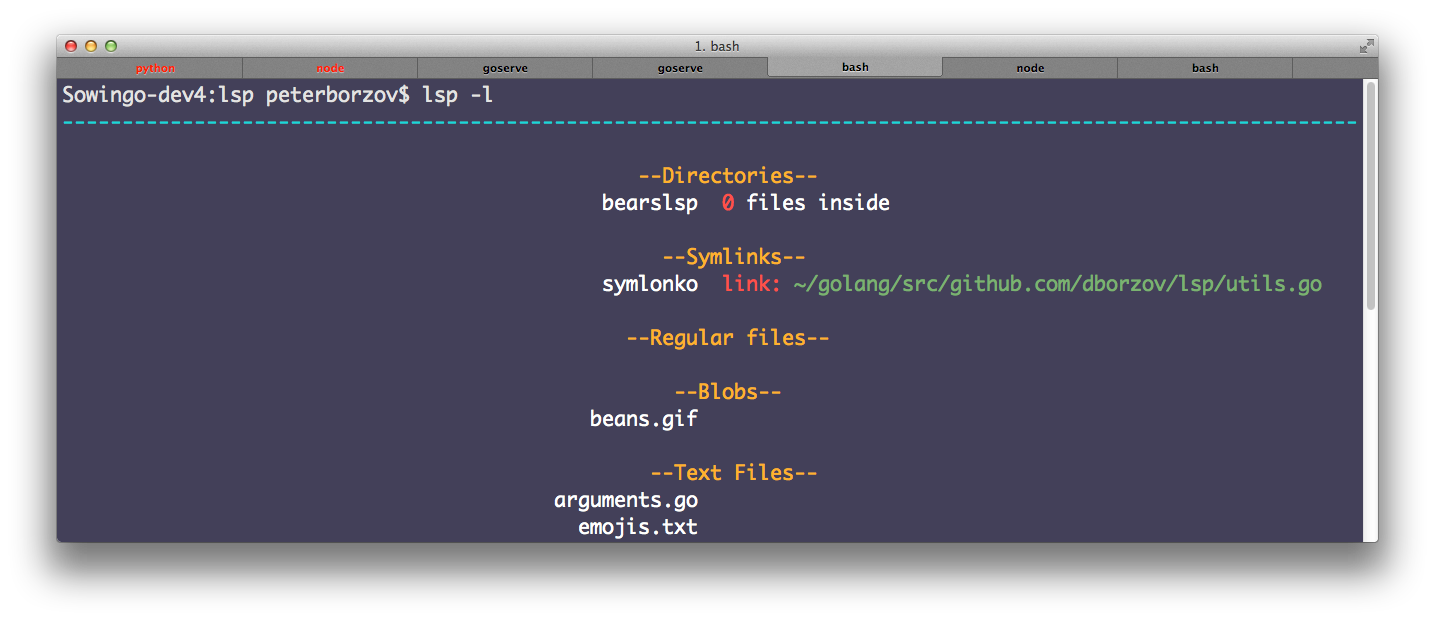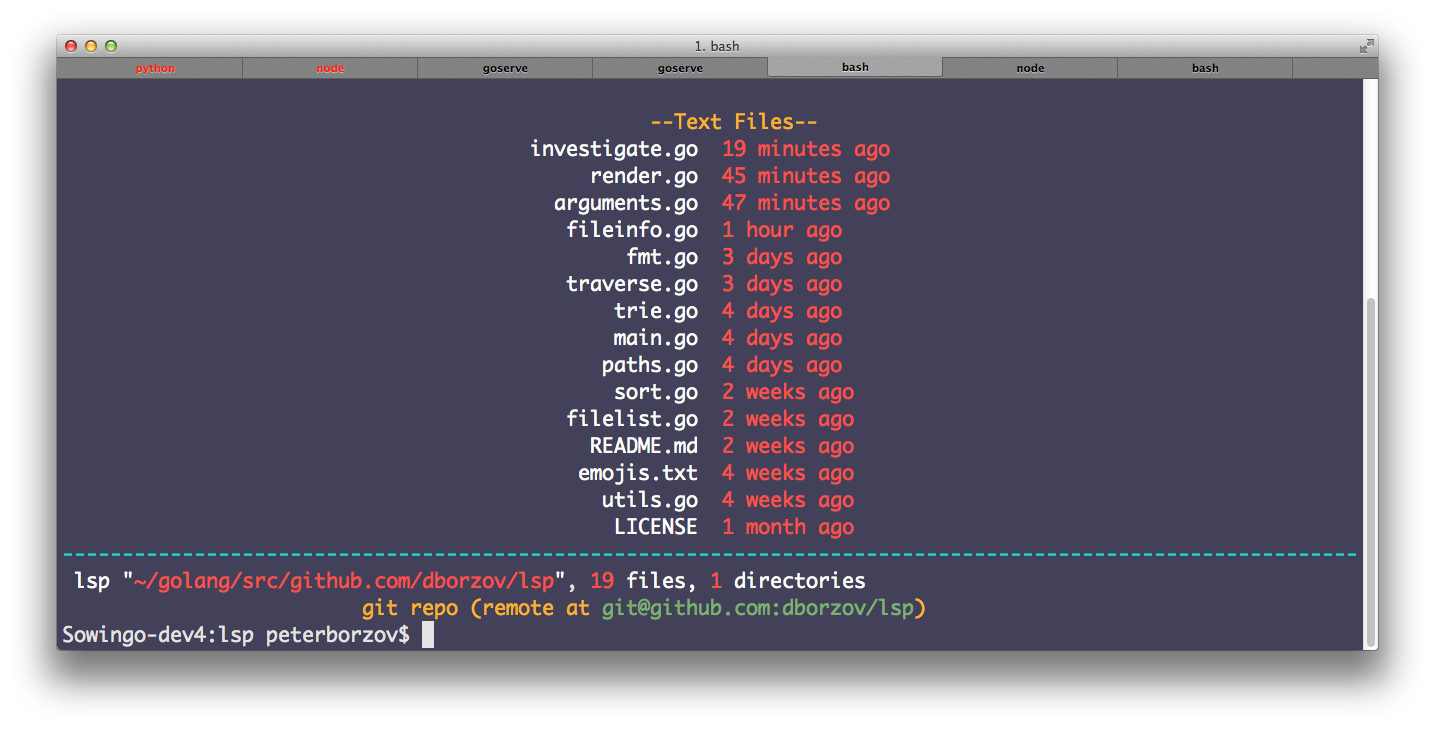https://github.com/dborzov/lsp
lsp is like ls command but more human-friendly
https://github.com/dborzov/lsp
filemanager ls unix
Last synced: about 2 months ago
JSON representation
lsp is like ls command but more human-friendly
- Host: GitHub
- URL: https://github.com/dborzov/lsp
- Owner: dborzov
- License: mit
- Created: 2014-08-09T04:21:58.000Z (over 11 years ago)
- Default Branch: master
- Last Pushed: 2021-02-21T20:34:28.000Z (almost 5 years ago)
- Last Synced: 2025-08-14T11:57:09.208Z (6 months ago)
- Topics: filemanager, ls, unix
- Language: Go
- Homepage:
- Size: 1.18 MB
- Stars: 532
- Watchers: 16
- Forks: 13
- Open Issues: 12
-
Metadata Files:
- Readme: README.md
- Contributing: CONTRIBUTING.md
- License: LICENSE
Awesome Lists containing this project
- my-awesome-github-stars - dborzov/lsp - lsp is like ls command but more human-friendly (Go)
- fucking-awesome-shell - lsp - An improved `ls`, with file descriptions in plain language and intelligent file grouping (System Utilities / Directory Navigation)
- awesome-shell - lsp - An improved `ls`, with file descriptions in plain language and intelligent file grouping (System Utilities / Directory Navigation)
README
## lsp: list files in a mildly human-frendlier manner
[](https://travis-ci.org/dborzov/lsp)
`lsp` lists files, like [`ls`](http://en.wikipedia.org/wiki/Ls) command,
but it does not attempt to meet
that archaic POSIX specification, so instead of this:
```
(bash)$ ls -l
total 16
-rw-r--r-- 1 peterborzov staff 1079 9 Aug 00:22 LICENSE
-rw-r--r-- 1 peterborzov staff 60 9 Aug 00:22 README.md
```
you get this:

## Features
#### File Groups
Files grouped by type (with `-l` key or in modes when file type not shown). `lsp` distinguishes binary, text and executable files, symlinks and is aware of weird types like devices and unix socket thingy:

#### Modification time in human-friendly format
`-t` key for when you are interested in modification time. It turns to the mode that makes most sense to me when I want to look up modtimes, sorted within file groups from recent to latest:

Sometimes relative times are not very readible as well (like when you are interested in a specific date), use two flags `-sl` to show the full UTC timestamp in properties.
#### Size in human-friendly format
`-s` key, similarly to modtime key, shows file sizes and sorts within file groups from largest to smallest:

#### Async Timeout
The file information is collected asynchronously, BFS-like, with a separate thread for each file and a timeout threshold.
That means that the execution is not going to freeze because of some low-response device driver (like external hard drive or optical drive) or collecting info about a huge directory.
#### Align by left
I have been playing with aligning files and descriptions by center, and I like that you can see files with the same extension right away, but there are deifinitely cases when it gets weird.
For now, there is `-p` key to render the file table in the left-aligned columns:

## Todo before v1.0
- [ ] Rewrite outline formatting: with the current design too much space is wasted, long filenames break things
- [x] Mark executable files as such
- Think about how to represent file rights and ownership
- Approach hidden and generated files as outlined in [issue#3](https://github.com/dborzov/lsp/issues/3)
- Better test coverage
- Expand in this README on philosophy of the project (tool in the unix way, minimize surprises, nothing's to be configurable)
- Think of TODO list points
Github Issues and pull requests are very welcome, feel free to [message me](tihoutrom@gmail.com) if you are considering contributing.
See [CONTRIBUTING.md](CONTRIBUTING.md) for intro to the codebase
## Installation
`lsp` is written in the `go` programming language.
It can be installed using `go get`.
```
$ go get github.com/dborzov/lsp
```
Then make sure that your `$PATH` includes the `$GOPATH/bin` directory.
To do that, you can put this line your `~/.bash_profile` or `.zshrc`:
```
export PATH=$PATH:$GOPATH/bin
```
Once it becomes more functional, `lsp` will be distributed in native binaries
(without dependencies) for all platforms (Linux, MacOS, Windows).
## Misc
MIT license.